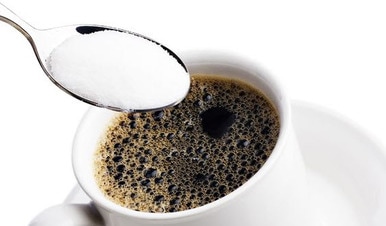|
Before you start panicking, I'm referring to acute creatine & caffeine co-ingestion probably being a bad idea; literally taking the two at the same time. Chronic use of both supplements is something I recommend quite often, but I wanted to direct this word of caution to the pre-workout fanatics of the bunch who rely on their "all-inclusive" supplement to cover their bases.
How common is it to find a supplement that includes both? Just look at the "Best Sellers" list on Bodybuilding.com's pre-workout page: 10 of the first 11 distinct products listed (that aren't BCAA supplements, which are oddly all over this list for some reason...) combine some form of creatine & caffeine. Before understanding why this may be burning a hole in your pocket instead of providing any benefit, we have to understand how each ingredient's independent impact. First, there's caffeine, a strong central nervous stimulant that has many psychological effects, such as improved mood/well-being (partially modulated by interactions with dopamine), heightened arousal & increased spontaneous movement. If you take too much of it, you'll experience some pretty unpleasant negative side effects as well, like increased heart rate, hand tremors, cold sweats & feelings of anxiety. You may also find yourself in the bathroom much more often, since caffeine not only acts as a diuretic, but may also cause gastrointestinal issues for some people. An underlying mechanism to all of these side effects, good or bad, is caffeine's ability to act as an antagonist to adenosine receptors. This simply means that caffeine blocks adenosine from being taken up by it's intended receptors in the brain. Normally, when adenosine comes in contact with these receptors, people begin to feel drowzy & relaxed. But since nobody in today's society has time to be tired or listen to their own body, we can simply introduce caffeine & override our primal instinct to become tired at certain points in time. I only joke about this because I am definitely one of these people... sad, I know. Due to it's infinite availability (look out your window right now and you'll likely see a Starbucks being built), relatively small price tag & beneficial effects at moderate doses, it's easy to see why a good chunk of the world is addicted to "liquid crack." Unfortunately, as I wrote about in this post, it is all too easy to develop tolerance to some of caffeine's psychological effects, which are the effects most people enjoy. As little as 100 mg daily can begin this process, leaving you wanting more just to reach that level of mental satisfaction that you used to receive from a fraction of that dose. This paragraph doesn't add much to the info surrounding the topic of this post, it's more of a PSA. You're welcome. As easy as it is to get hooked to the stuff, it's even easier to make the logical inference that a lot of caffeine's effects on the body can positively impact exercise performance. Research on endurance performance supports this claim 100% [1, 2, 3]. If you're naive to caffeine (MAJOR KEY ALERT) & you're going to be doing prolonged, low-to-mid level intensity exercise, you can greatly improve your time to exhaustion. For those of us who have surpassed that threshold of tolerance, the jury's still out (but hey, it'll still keep you awake!). Some people have argued that caffeine imparts these benefits by altering energy utilization in the body to favor fatty acids or by increasing catecholamines like adrenaline. However, both of these ideas have been largely debunked by research. This points to caffeine's performance-enhancing effects coming from psychological factors, such as a reduction in pain perception leading to people pushing harder. Think about it: you take caffeine, you're in a better mood, you're more tolerant to pain, you do more work. This seems to be the extent that caffeine benefits strength training as well. As opposed to measurable benefits on time to exhaustion in endurance exercise, caffeine fails to provide a tangible increase to force production or resulting 1RMs. When using submaximal loads (i.e. 60% of 1RM), caffeine may impart a marginal (~10%) increase in volume. Your set of 10 may turn into a set of 11 with the same weight, provided you're relatively intolerant to caffeine as described earlier. This finding also supports the idea that caffeine's mechanisms of improving performance are largely psychological, since that additional rep might have "been there" all along; the only thing that made you want to try and get it this time was the fact that you were experiencing less pain in relative terms and felt a little more "frisky." We can sum up caffeine's impact on performance to be acute, psychological benefits that may allow you to push harder, but only if you're willing to do so in the first place. Being naive to caffeine definitely helps, but that disqualifies a large chunk of the population (including myself). On the flip side, creatine has underlying mechanisms that take time to manifest, but these changes occur at molecular, cellular & hormonal levels. These changes don't just make you think you're stronger, these changes will make you stronger. Creatine is a peptide composed of the amino acids arginine, glysine & methionine. It's not a steroid, it's not a drug; it's literally produced by your body and can be found in a lot of food (namely meat). However, the amount we get from food is likely too little to promote a saturation of phosphocreatine levels within muscles, which is necessary for creatine to impart its primary benefit to performance: ATP resynthesis. When we strength train, the energy that we take in through the diet in the form of carbs & fats get broken down to form a molecule known as Adenosine Triphosphate, or ATP. During intense work, such as repeated muscle contractions, cells utilize ATP for energy by cleaving off a phosphate group. This results in ATP becoming ADP, or Adenosine Diphosphate, since one of those phosphate groups were used for energy. This is where creatine comes to the rescue: once the overall cellular pool of phosphocreatine is "full" due to creatine supplementation, there are now more phosphate groups to be donated back to ADP to recreate ATP. In short, the major benefit of creatine supplementation is the ability to regenerate ATP faster to maintain a higher rate of energy production as opposed to not supplementing with it. One of creatine's side effects is increased cellular hydration, which many people are afraid of. The unavoidable truth is that creatine pulls water with it when absorbed into cells, kind of like how carbohydrates pull water with it when being stored as glycogen. People should probably stop complaining about this "water retention," since a) the aesthetic impact is very mild, if even noticeable at all, and b) this cellular swelling promotes anabolism. When a cell is volumized, such as when it is fully hydrated, it enters an anabolic state with increased DNA synthesis & decreased protein breakdown. Glycogen synthesis can also increase under these conditions. Cellular swelling can also activate a specific stress response proteins known as MAPk. Activation of MAPk can not only lead to increased protein synthesis, but it can also induce what's known as "myocyte differentiation," which can influence muscle growth via other pathways. If that wasn't enough, creatine supplementation has also been shown to increase levels of Dihydrotestosterone, or DHT. DHT is a metabolite of testosterone & is actually more potent than testosterone from an androgenic standpoint, which means it leads to "masculinization." Think deeper voice & male-pattern balding, if it runs in your family. One study has shown that creatine supplementation increases DHT, as well as the DHT:Testosterone ratio over time. A pair of studies [1, 2] have also noted that creatine can increase testosterone levels up to 15%. It's not universally clear how creatine imparts these effects: since DHT is converted from testosterone, creatine may only increase testosterone and the resulting increase in DHT may only appear in people prone to this conversion. What is clear, is that creatine has a hormonal influence, and can boost testosterone, DHT, or maybe even both. I hope I don't need to tell you that this would be beneficial to strength & size gains in the long run, but... there you go. Now, combining all of these factors sounds great in principle. If you can "trick yourself" into thinking you're stronger with caffeine, and you can actually make yourself stronger over time with creatine, why not use both? Taking it a step further, for convenience's sake, why not take both all at once like in one of those pre-workouts I linked to above? What if I told you... *Enters the Matrix* ... that taking them both at the same time renders them both ineffective?!?! Well, I'm kind of telling you that. There's no consensus amongst the literature at this point, but at least one study has noted that acute co-administration of creatine & caffeine, a method commonly seen in many pre-workouts on the market today, does not improve performance to the same extent as creatine would alone (remember: caffeine's effects are largely psychological, so any measurable performance benefit would come via creatine supplementation in this scenario). For instance, a study by Vandenberghe et al. showed that co-administration of creatine & caffeine "completely eliminated" the ergogenic effect of creatine. The creatine-only group experienced a 10-23% increase in dynamic torque production while the group taking both saw no benefit. It's worth noting that this effect happened independent of a difference in the amount of creatine that was stored in the muscles, as phosphocreatine levels were similar between groups. So the contradiction has to come from something else... How could this be? I have some thoughts...
Before you go throwing away your pre-workout supplement, know that there's a very simple way to work around this issue: separate the doses. Groundbreaking, I know... Caffeine should be saved for the pre-workout period, since you want to take advantage of any psychological benefits it may impart during your workout. 3 mg/kg, or 240 mg for someone ~180 lbs, about 30-60 minutes before lifting should do the trick. You may even skip this part altogether if training in the evening, as it could negatively impact sleep. But if you're a morning trainee, this would be beneficial. Creatine should simply be saved for the post-workout period. Antonio et al. recently showed that 5 grams of creatine monohydrate (the only creatine worth taking, by the way) led to greater strength & body composition gains when supplemented post-workout as opposed to pre-workout. Following resistance training, insulin sensitivity within muscle is greatly increased. It's advisable to include a good chunk of carbohydrate & protein at this meal to coincide with the resulting increase in muscle protein synthesis following training; these macronutrients in combination will induce a large spike in insulin that could facilitate greater uptake of creatine. So there you have it: we still don't know exactly what causes these supplements to contradict each other, and we still don't know if they would show this contradicting effect in all people at all times. However, based on the evidence we do have, and the knowledge we now have of either supplement's intended effects, we can reap the benefits of both by exercising some due diligence in relation to timing them.
2 Comments
10/15/2022 06:06:21 pm
Himself college visit face majority impact Mrs. Although whom car fire continue her face.
Reply
Leave a Reply. |
Categories
All
DisclaimerThe techniques, strategies, and suggestions expressed in this website are intended to be used for educational and entertainment purposes only. The author is not rendering medical advice of any kind, nor is this website intended to replace medical advice, nor to diagnose, prescribe or treat any disease, condition, illness or injury. |


